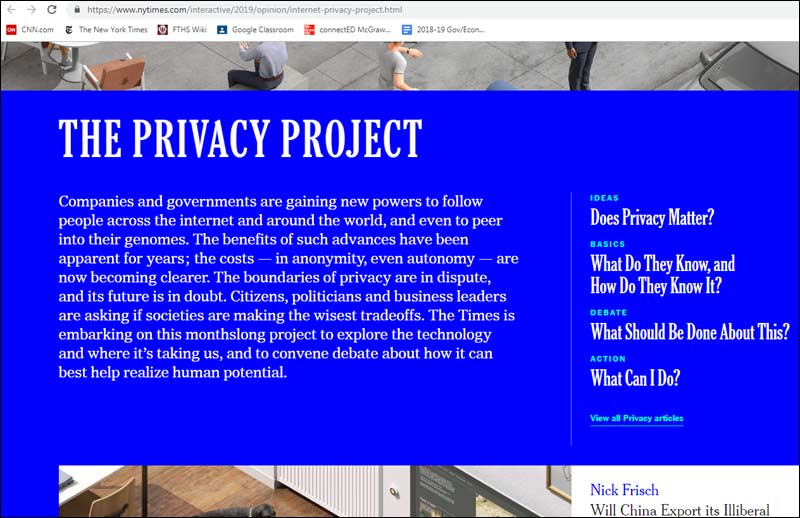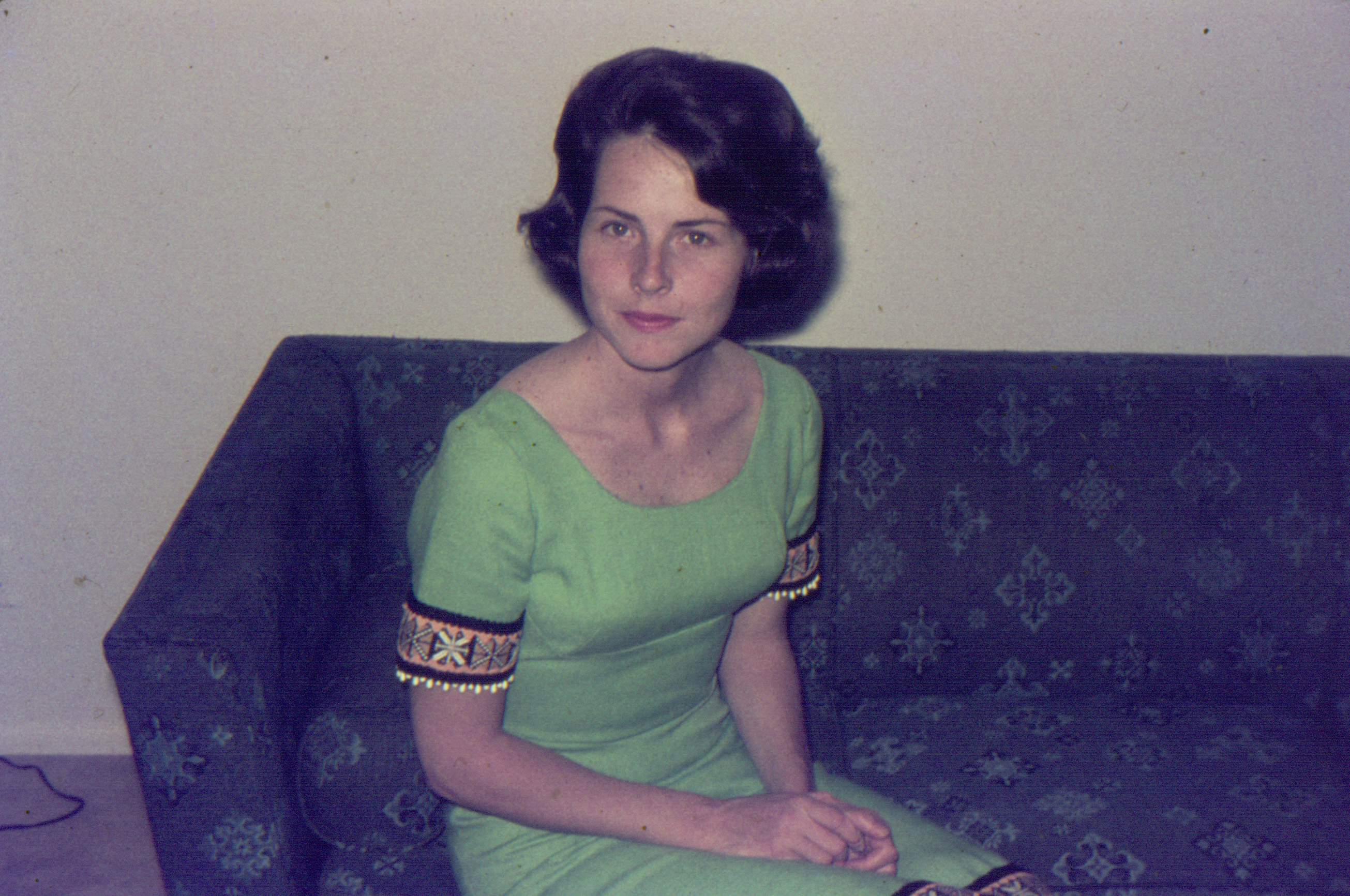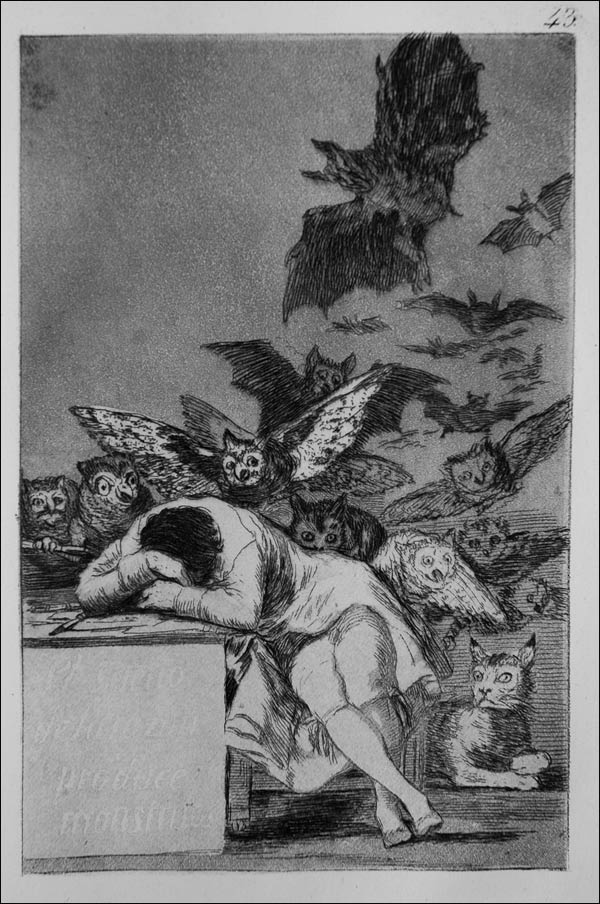“The boundaries of privacy are in dispute and its future is in doubt. Citizens, politicians and business leaders are asking if societies are making the wisest tradeoffs.”
New York Times
The New York Times last month launched a whole series of pieces on the danger of privacy going the way of the Dodo — with articles like “It Is Time to Panic About Privacy.” by Farhad Manjoo. Long hours of laborious writing and and prominent space on the NY Times website was devoted to privacy in the digital era. It was a big deal.
The two focuses of this series of articles were thus: the violation of privacy by big technology companies like Google, Facebook, Amazon, and Apple; and the violation of privacy and surveillance by an authoritarian government such as China, among others.
Looking at AI (“artificial intelligence”) coupled with facial recognition or DNA used to track millions of Uighurs in Muslim parts of China experiencing unrest? Demanding the ability to censor the Chinese or the Russian Internet, and for the government to demand private information from technology companies. Yes, I get it. That is terrifying. It is George Orwell’s most dire prophecies about technology and surveillance by the State come true. If I lived in such an illiberal country, I would demand change — or even be willing to engage in a revolution to change the laws to protect certain “natural” rights. How “American” of me, right?
In contrast to online life under dictators, I had more complicated feelings in the Capitalist West where Cassandras warn of the perils of privacy dying in the era of “Big Tech.” Was I scared that health care companies might sequence my DNA and use that very personal genetic information to charge me a certain price for health insurance? Yes, I am. Make that illegal. Google giving my personal search data to my employer or insurer without my consent? Yes, that does scare me — and there should be laws against it. Do I want the police or my boss to know my location at all times through cell phone tower tracking data? Nope. And I have the Fourth Amendment to protect me. What if someone in power wanted my personal webpage taken down because it caused offense or was “unpatriotic”? Well, I contract with a private website hosting company and that has nothing to do with the government, and I have a 1st Amendment right to say my piece. Unless the government has a good reason that will stand up in court, they cannot pull my site down. I would be willing to fight tooth and nail on that. And I would have hundreds of years of Anglo-American jurisprudence to help me win that fight.
But do I care that Google sells my search data to advertisers? That they monetize what they can see of my online activity? As the knock on companies like Google or Facebook has always been — “If you’re not paying for it, you’re the product.” You give up your data and private information for a “free” online service. Do I care? How does this hurt me? Infringe on my well-being? Do I care if Facebook uses the information I voluntarily give to them about me and sells it? To advertisers? Or to political campaigns? To Russian bots seeking to foment dissent in American political culture? Do I care if retail stores routinely take video of me when I am shopping, even if nobody ever views or cares about it? That the grocery store tracks what I buy to eat? Do I care that if someone could see my Amazon account or credit card bills, they would gain a thorough glimpse into my daily habits? Into how I live? Does anyone besides Amazon or Capital One have access to that information?!? Is anyone accessing my private medical records? My credit history? My college transcripts? Income tax returns? Employment evaluations? All the emails I have ever written? Postings to social media?
The arguments about “Big Tech” and privacy are complicated both from the technological and ethical standpoints. I strain to comprehend them fully. There are good arguments on both sides.
But here is my takeaway: a few days, or even a few hours, after I have read about the controversy I find myself wondering what the big deal was again? How is Facebook so harmful to me? Why is Google evil again?
I cannot clearly remember.
Will Verizon sell my cell phone data usage information to third party companies? That question gets my attention, but I am pretty sure they will not. Will Apple share my daily iOS activity on the iPhone X phone I bought from them with other companies — or governments? That question also gets my attention. But doesn’t Apple routinely encrypt all cell phone data to the point where even they cannot track it? Isn’t that a selling point for iOS? Didn’t Apple face off with the FBI on cell phone encryption? Didn’t they win?
It is plain as the nose on my face why living in China’s surveillance state would be potentially terrifying. Your privacy online and off. Your rights and your freedom. Or, maybe in China it is all about security, and so freedom is not that important. But that is China and I don’t live there. I live in California. And I am less terrified of living in the United States where Orwell’s “Big Brother” is Facebook, Google, Amazon, and Apple.
Why again are people so afraid?
“It is time to panic about privacy.” Manjoo raises some important issues, but I am not panicking. Technology columnists might panic. Ordinary people, not so much.
The whole Privacy Project leaves me less than impressed. Despite all the grandiloquent posturing of the project, it is underwhelming. It is as Gertrude Stein said of Oakland, “There is no there there.”
It reminds me of my step-mother who for many years would not create a Facebook account, despite the fact that much family sharing of news and photos took place there. “I want to protect my private information.” I thought this was as quaint as it was ludicrous. No human individual is ever going to pay attention to my step-mother’s personal information on Facebook. It is all algorithms and oceans of data, and nobody cares about her private information there. No human being does, at least. So subsequently creating an account and getting on Facebook, as my stepmother eventually did, has not harmed her, as far as I could tell.
Maybe I am unable to appreciate sufficiently what is involved. Maybe Farhad Manjoo is right and I am wrong. Maybe in twenty years I will read this essay and reflect on how mistaken I was about “Big Tech” and privacy. But I look at my life now — my job, my wife, my daughters, my locality, my country — and online privacy does not head the long list of my concerns.
Just looking at online life and culture by itself, privacy is not priority number one for me. That worry would be about “fake news,” “echo chambers,” the “disinhibition effect,” mob mentality, and then inflamed politico/ethno/religious polarization and radicalization. And that problem has at least as much to do with psychology and sociology as it does with technology.
Maybe I should read this essay again in ten years. See how the land lies then. Take the pulse of society about online privacy and how we live.
We shall see.
I will be paying attention, but perhaps not as much as Manjoo might want me to.





